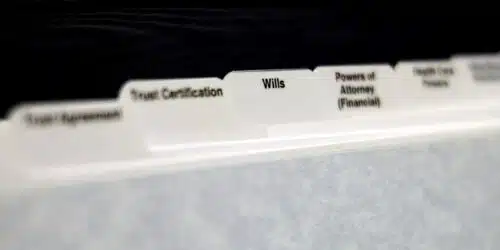Meeting with an estate planning lawyer can be a stressful event for any one. Once you’ve scheduled a meeting with a lawyer to draft a Will or multiple Wills, and Powers of Attorney for Property and Personal Care, you know you are headed to a meeting where someone will ask you what you want to happen with your assets when you die. Who takes care of your kids if you are dead? Do you want to be cremated? Who is going to manage your affairs if you lose the capacity to do so? And many more equally unpleasant questions. To make the question and answer part of the meeting easier, try and bring the information you can, and think about some of these issues before you head off to your meeting.
Generally speaking, your lawyer is likely to ask for a general description of your assets, how you own such assets (i.e. sole ownership, jointly with another person) and whether there are designated beneficiaries named on any of your accounts. Your lawyer is also likely to ask for personal information such as information related to your occupation, date of birth, citizenship, religious beliefs, marital status, identity of any dependents and whether any named beneficiary is the recipient of ODSP (Ontario Disability Support Program payments) or has capacity or vulnerabililty issues.
As you continue on in the estate planning process, some further questions you may be asked include:
- Whether you have a marriage contract, cohabitation agreement or separation agreement;
- Whether you own shares in the capital of a private corporation and if so whether you are a party to a shareholders’ agreement;
- Whether you own personal property of significant value (i.e. wine or art collections, rugs, etc.);
- Whether you are the owner of intellectual property, and
- Whether you have assets in different jurisdictions.
As your lawyer receives answers, more questions will often follow.
Some of these questions may seem too personal. Further, you may question whether they are really necessary. The answer is typically yes, these questions are necessary. Not only will the answers to these questions inform the drafting process – for example, if you own personal property of significant value or shares in a private corporation, there are advantages to having multiple Wills, and if a beneficiary relies on ODSP then there are special provisions that should be included in the Will – but your lawyer is also required to ask these questions to assess your capacity to make a Will. After all, in order for a Will to be valid, the person executing the Will must have had capacity to make the Will.
The advantage of having a qualified estate planning lawyer draft your Will is that they will not only know what is required in order for a Will to comply with applicable legislation in their jurisdiction, but they will also be able to take the information you provide and recommend structures that support your needs and end goals. An estate planning lawyer will know what questions to ask. This article is only meant to be a guide, and there may be additional information your lawyer will request.
As an aside, it is important to remember that estate legislation varies from Province to Province. Therefore, if you want to know whether you have a valid Will in Ontario, you must consult with an estates lawyer qualified to practice law in the Province of Ontario. The good news – if you require advice with respect to multiple jurisdictions, your lawyer can get you in touch with the appropriate person to answer your questions.
Overall, for those of you who haven’t yet had your Will drafted or for those of you whose Will is out of date, take a moment to consider the above questions and gather the above information so that you are ready to meet with a qualified estate planning lawyer.
This blog post was written by Diana Tebby, a member of the Real Estate and Wills and Estates teams. She can be reached at 613-369-0384 or at diana.tebby@mannlawyers.com.








